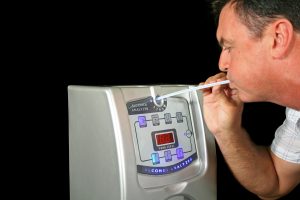 Ohio’s DUI laws (called ‘OVI’ in Ohio) criminalize driving with a prohibited breath alcohol concentration. To determine whether a person has a prohibited breath alcohol concentration, law enforcement officers use breath-testing machines. If a person refuses a breath test, there are consequences. However, differences in height, age, gender, and smoking habits make some people physically unable to provide a sufficient breath sample. As a result, some people are accused of refusing a breath test when they didn’t.
Ohio’s DUI laws (called ‘OVI’ in Ohio) criminalize driving with a prohibited breath alcohol concentration. To determine whether a person has a prohibited breath alcohol concentration, law enforcement officers use breath-testing machines. If a person refuses a breath test, there are consequences. However, differences in height, age, gender, and smoking habits make some people physically unable to provide a sufficient breath sample. As a result, some people are accused of refusing a breath test when they didn’t.
Breath Tests in Ohio OVI Cases
Two paragraphs of Ohio Revised Code section 4511.19 make it illegal to operate a vehicle with a prohibited concentration of alcohol in a driver’s breath. Testing the alcohol level in a person’s breath is really a proxy for determining the level of alcohol in a person’s blood. The alcohol in a person’s breath is a waste product being eliminated from the body and does not affect a person’s driving ability. It is alcohol in a person’s blood which reaches the brain and impairs driving skills.
Research shows a person’s breath alcohol concentration is proportional to the person’s blood alcohol concentration. For that reason, Ohio makes it ‘per se’ (by itself) unlawful to operate a vehicle with a proscribed breath alcohol concentration. The prohibited concentrations are .080 or more grams of alcohol per 210 liters of breath [ORC 4511.19(A)(1)(d)] and .170 or more grams of alcohol per 210 liters of breath [ORC 4511.19(A)(1)(h)].
As it is illegal to operate a vehicle with a prohibited breath alcohol concentration, Ohio uses breath-testing machines. When a person is arrested for OVI, they are often asked to submit a breath sample into a machine for the machine to analyze the breath alcohol concentration.
Consequences of Breath Test Refusals
If a person is arrested for OVI and refuses a breath test, there are three consequences. First, the person is immediately subjected to an Administrative License Suspension. The suspension lasts for one year on a first OVI within ten years, and the duration of the suspension increases with each OVI charge or test refusal within ten years. Second, if the person has a trial, the jury is instructed they can consider the breath test refusal as evidence of guilt. Third, if the person has a prior OVI conviction within the last 20 years, he or she is charged with a separate offense for refusing a breath test and having a prior OVI conviction.
Unfair Allegations of Breath Test Refusals
A recent scientific study published in the Medico-Legal Journal concluded some individuals cannot provide the volume and/or flow rate of breath necessary for an evidential breath alcohol test. Previous research concluded individuals with respiratory disorders were unable to provide satisfactory evidential breath samples. The recent study aimed to evaluate the ability of healthy individuals, without respiratory disorders, to provide the requisite volume and flow necessary for breath alcohol testing.
The researchers analyzed the spirometry records of 281,210 volunteers who had no history of respiratory disease. Based on their analysis, the researchers reached several conclusions. First, people of shorter stature are eight times less likely to be able to provide a sufficient breath sample. For older people, the risk of being unable doubles with each decade from the 40s to the 60s. Four times as many females would be unable to provide a sufficient sample, and the risk of being unable to do so is doubled for smokers.
While physical inability to provide a breath sample is not an issue in most Ohio OVI cases, it is an issue in some cases involving allegations of breath test refusals. For those cases, the new study is a valuable resource.
 Columbus OVI/DUI Attorney Blog
Columbus OVI/DUI Attorney Blog

